#ixer 1
Text
20 Questions: Writer's Edition!
Thank you for the tag, @chierafied! I'm sorry for such a late response!
***
1. How many works do you have on AO3?
I believe I have 45!
2. What’s your total AO3 word count?
221,141 - started in 2019
3. How many fandoms have you written for and what are they?
Fandoms currently posted include Inuyasha and Doctor Who. But the first fanfic (unpublished and lost now) I ever wrote was for Gundam Wing, and I'm currently working on my first Zelda - Breath of the Wild piece.
4. What are your top 5 fics by kudos?
E Pluribus Unum
When winning against Naraku takes everyone from them, Sesshoumaru and Kagome find themselves suddenly thrust together and trying to survive their grief as they figure out how to get rid of the completed jewel and move on with their lives.
When Comes the Rain
A miko and a demon lord share a common interest when it rains, and in the quiet and peace of these stolen moments, something neither of them could have predicted begins to grow...
On Unexpected Love
It's by chance that they happen across each other again, but it's by choice that they don't let each other go.
Chasing Your Tail
When an item up for auction offers Kagome a piece of her past, she jumps at the chance to hold onto it. But she may be getting more than she bargained for when that past bids against her and then follows her home...
Fixer Upper
500 years and a fixer upper are no match for married mayhem...
5. Do you respond to comments, why or why not?
Yes. On AO3. I don't post on other sites anymore, but their system was more difficult to work with. But AO3 makes it very easy, and it's one of my favorite things about the platform. If someone takes the time to write me a comment, it makes my day, and I'm going to respond back to them, even if it's only to say thank you. But I love it when there's the opportunity to discuss what's happening in the story and answer questions!
6. What’s the fic you’ve written with the angstiest ending?
Probably Until Death because it dealt with tragedy and was left open ended. There's still hope there though.
7. What’s the fic you’ve written with the happiest ending?
Morning Light. It's a proposal one-shot.
8. Do you write crossovers? If so what is the craziest one you’ve written?
Crossovers have never been my thing, but I have one planned - potentially. We'll see if I ever get to it. But it's a crossover between Zelda and Inuyasha.
9. Have you ever received hate on a fic?
I have. I'm all for constructive criticism - that helps me do better as a writer. But there have been a few comments here and there that go beyond that. Most of the time I ignore that. Recently I did not because the comment crossed some major lines that could potentially affect other readers, so I made my opinion on their attitude known there. I believe in constructive and effective criticism and embrace that. But I won't put up with readers going out of their way just to be an ass. That's a disservice to fandom in general.
10. Do you write smut? If so what kind?
LOADED QUESTION, lol! I like to think I write love and/ or intimacy. If I write a sex scene, it's going to be with a purpose that fits within the context of the story. Personal bit of info - I'm demi. So, smut for smut's sake has never been my thing (no shade to those who feel otherwise!). In my case, I just don't go there. Any sex scene I've included in my work is there for a reason (though it may not always seem that way to readers). But if asked, I can explain why I included every single one I've written and why I felt the scene added to the story. I do enjoy exploring the different facets of sex within a relationship, particularly because PWP isn't my thing, and I want to see the connection that intimacy brings explored. So, I don't shy away from writing it (though writing friends can attest to the almost panic attacks I have including it).
11. Have you ever had a fic stolen?
Not to my knowledge. But I have had writing stolen before in my professional life, so I feel pretty adequately prepared to deal with it should the time come. Hopefully not though.
12. Have you ever had a fic translated?
I have not! Someday I want to finish translating EPU into Spanish. I've had people request it before, but I'm just not comfortable yet allowing people I do not know to translate what I've written.
13. Have you ever co-written a fic before?
Tried. It's not my thing. I'm too particular with how I write (as most writers are), and I find collaboration difficult. It's hard for me to stay motivated to work on co-written fics. As a rule now, I just don't do it, but I would make and exception for one person (you know who you are!) because we have this weird brainwave thing going on, and it might just work, lol.
14. What’s your all time favorite ship?
It is, likely unsurprisingly, SessKag. Though, I am really enjoying exploring the various ships within the Zelda fandom.
15. What’s a WIP that you want to finish but don’t think you ever will?
Deseo a una estrella.
16. What are your writing strengths?
I feel like I can never evaluate myself on these matters, so I'm going to go with what others have told me and trust them. The comments I get most about my writing tend to be about how I say a lot with very few words and then an ability to evoke strong feelings and emotion. I have appreciated that feedback and hope my writing truly reflects that!
17. What are your writing weaknesses?
I am a SLOW writer. Between life and a tendency to overanalyze the most ridiculous things, it's hard to just punch work out.
18. What are your thoughts on writing dialogue in other languages in a fic?
I love it, lol. Foreign language has been a part of my educational background since elementary school and was always my favorite subject. So, I get really excited to see other languages pop up in fic. An unpublished piece (SessKag) I'm working on called Beneath the Eternal Blue Sky actually includes a language I created to use in fic. Tribal inuyoukai group (Sesshoumaru's extended family) has their own native language, and that's fun for me to play with. Poor Kagome though, lol.
19. What was the first fandom you wrote for?
Gundam Wing! But the first piece I ever published was for Inuyasha.
20. What’s your favorite fic you’ve written?
This changes every time I'm asked. But right now? Probably the EPU one shot First Blush.
I hit publish accidentally more than once when writing this, so I apologize for the mess that made!
Tagging @sereia1313, @jafndaegur, @stormielikeweather, and @ladygoshawk if they want to participate!
4 notes
·
View notes
Photo
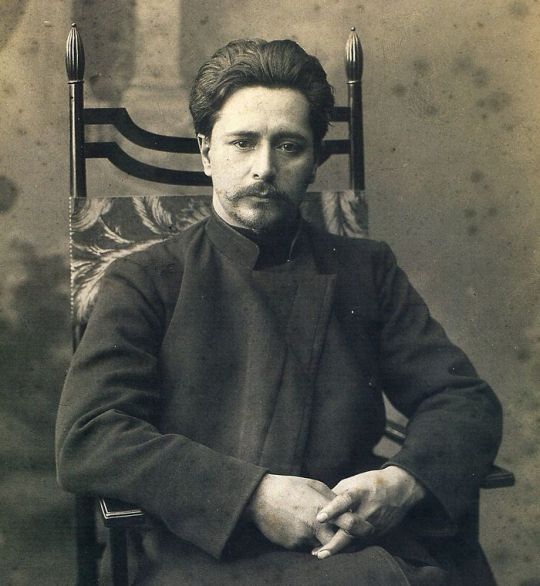
Began her mother, but sobbing, she grew silent
Leonid Andreyev (1871-1919)
Born in 1871 at Orel, Andreyev struggled for many years to earn a livelihood as a lawyer. He began writing in 1900, and was helped and encouraged by Gorky. The note of tragedy and fatalism that characterizes his plays and novels is present also in his numerous short stories, of which Silence is typical.
The present version, translated by John Cournos, was published by Brown Brothers, copyright, 1910. It is reprinted by permission of the present owners, Frank-Maurice, Inc.
Silence
Pane moonlit night in May, while the nightingales sang, Father Ignatius’ wife entered his chamber. Her countenance expressed Itlircring, and the little lamp she held in her hand trembled. Approaching Ixer husband, she touched his shoulder, and managed to say between her sobs:
“Father, let us go to Verochka.”
Without turning his head, Father Ignatius glanced severely at his wife over the rims of his spectacles, and looked long and intently, till (he waved her unoccupied hand and dropped on a low divan.
“That one toward the other be so pitiless!” she pronounced slowly, With emphasis on the final syllables, and her good plump face was distorted with a grimace of pain and exasperation, as if in this manner she winked to express what stern people they were her husband and daughter.
Father Ignatius smiled and arose. Closing his book, he removed his nectacles, placed them in the case and meditated. His long, black beard, in woven with silver threads, lay dignified on his breast, and it slowly heaved at every deep breath.
“Well, let us go!” said he.
Olga Stepanovna quickly arose and entreated in an appealing, timid voice:
“Only don’t revile her, father! You know the sort she is.”
Vera’s chamber was in the attic, and the narrow, wooden stair bent and creaked under the heavy tread of Father Ignatius. Tall and ponderous, he lowered his head to avoid striking the floor of the upper story, and frowned disdainfully when the white jacket of his wife brushed his face. Well he knew that nothing would come of their talk with Vera.
“Why do you come?” asked Vera, raising a bared arm to her eyes. The other arm lay on top of a white summer blanket hardly’distinguish- able from the fabric, so white, translucent and cold was its aspect.
“Verochka!” began her mother, but sobbing, she grew silent.
“Vera!” said her father, making an effort to soften his dry and hard voice. “Vera, tell us, what troubles you?”
Vera was silent.
“Vera, do not, we, your mother and I, deserve your confidence? Do we not love you? And is there someone nearer to you than we? Tell us about your sorrow, and believe me you’ll feel better for it. And we too. Look at your aged mother, how much she suffers!”
“Verochka!”
S: https://travel.doturkey.com/silence-part-1/
0 notes
Photo
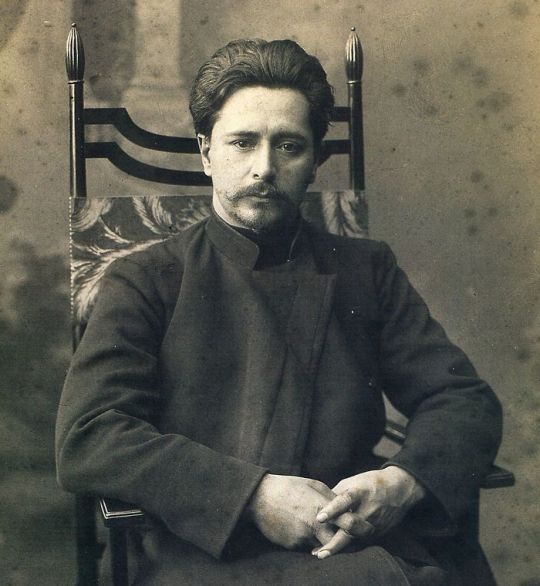
Began her mother, but sobbing, she grew silent
Leonid Andreyev (1871-1919)
Born in 1871 at Orel, Andreyev struggled for many years to earn a livelihood as a lawyer. He began writing in 1900, and was helped and encouraged by Gorky. The note of tragedy and fatalism that characterizes his plays and novels is present also in his numerous short stories, of which Silence is typical.
The present version, translated by John Cournos, was published by Brown Brothers, copyright, 1910. It is reprinted by permission of the present owners, Frank-Maurice, Inc.
Silence
Pane moonlit night in May, while the nightingales sang, Father Ignatius’ wife entered his chamber. Her countenance expressed Itlircring, and the little lamp she held in her hand trembled. Approaching Ixer husband, she touched his shoulder, and managed to say between her sobs:
“Father, let us go to Verochka.”
Without turning his head, Father Ignatius glanced severely at his wife over the rims of his spectacles, and looked long and intently, till (he waved her unoccupied hand and dropped on a low divan.
“That one toward the other be so pitiless!” she pronounced slowly, With emphasis on the final syllables, and her good plump face was distorted with a grimace of pain and exasperation, as if in this manner she winked to express what stern people they were her husband and daughter.
Father Ignatius smiled and arose. Closing his book, he removed his nectacles, placed them in the case and meditated. His long, black beard, in woven with silver threads, lay dignified on his breast, and it slowly heaved at every deep breath.
“Well, let us go!” said he.
Olga Stepanovna quickly arose and entreated in an appealing, timid voice:
“Only don’t revile her, father! You know the sort she is.”
Vera’s chamber was in the attic, and the narrow, wooden stair bent and creaked under the heavy tread of Father Ignatius. Tall and ponderous, he lowered his head to avoid striking the floor of the upper story, and frowned disdainfully when the white jacket of his wife brushed his face. Well he knew that nothing would come of their talk with Vera.
“Why do you come?” asked Vera, raising a bared arm to her eyes. The other arm lay on top of a white summer blanket hardly’distinguish- able from the fabric, so white, translucent and cold was its aspect.
“Verochka!” began her mother, but sobbing, she grew silent.
“Vera!” said her father, making an effort to soften his dry and hard voice. “Vera, tell us, what troubles you?”
Vera was silent.
“Vera, do not, we, your mother and I, deserve your confidence? Do we not love you? And is there someone nearer to you than we? Tell us about your sorrow, and believe me you’ll feel better for it. And we too. Look at your aged mother, how much she suffers!”
“Verochka!”
S: https://travel.doturkey.com/silence-part-1/
0 notes
Photo
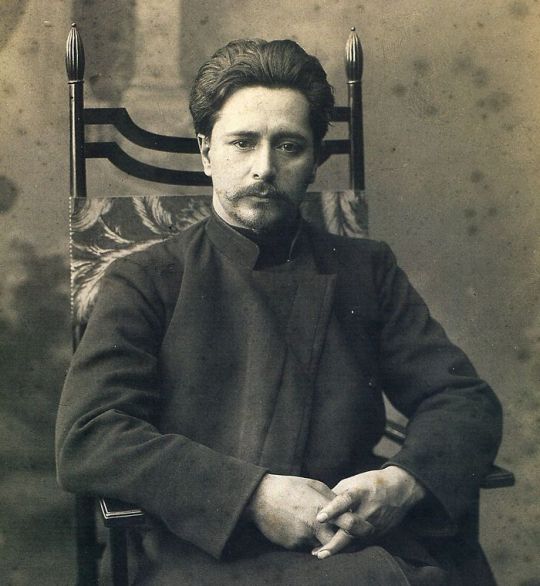
Began her mother, but sobbing, she grew silent
Leonid Andreyev (1871-1919)
Born in 1871 at Orel, Andreyev struggled for many years to earn a livelihood as a lawyer. He began writing in 1900, and was helped and encouraged by Gorky. The note of tragedy and fatalism that characterizes his plays and novels is present also in his numerous short stories, of which Silence is typical.
The present version, translated by John Cournos, was published by Brown Brothers, copyright, 1910. It is reprinted by permission of the present owners, Frank-Maurice, Inc.
Silence
Pane moonlit night in May, while the nightingales sang, Father Ignatius’ wife entered his chamber. Her countenance expressed Itlircring, and the little lamp she held in her hand trembled. Approaching Ixer husband, she touched his shoulder, and managed to say between her sobs:
“Father, let us go to Verochka.”
Without turning his head, Father Ignatius glanced severely at his wife over the rims of his spectacles, and looked long and intently, till (he waved her unoccupied hand and dropped on a low divan.
“That one toward the other be so pitiless!” she pronounced slowly, With emphasis on the final syllables, and her good plump face was distorted with a grimace of pain and exasperation, as if in this manner she winked to express what stern people they were her husband and daughter.
Father Ignatius smiled and arose. Closing his book, he removed his nectacles, placed them in the case and meditated. His long, black beard, in woven with silver threads, lay dignified on his breast, and it slowly heaved at every deep breath.
“Well, let us go!” said he.
Olga Stepanovna quickly arose and entreated in an appealing, timid voice:
“Only don’t revile her, father! You know the sort she is.”
Vera’s chamber was in the attic, and the narrow, wooden stair bent and creaked under the heavy tread of Father Ignatius. Tall and ponderous, he lowered his head to avoid striking the floor of the upper story, and frowned disdainfully when the white jacket of his wife brushed his face. Well he knew that nothing would come of their talk with Vera.
“Why do you come?” asked Vera, raising a bared arm to her eyes. The other arm lay on top of a white summer blanket hardly’distinguish- able from the fabric, so white, translucent and cold was its aspect.
“Verochka!” began her mother, but sobbing, she grew silent.
“Vera!” said her father, making an effort to soften his dry and hard voice. “Vera, tell us, what troubles you?”
Vera was silent.
“Vera, do not, we, your mother and I, deserve your confidence? Do we not love you? And is there someone nearer to you than we? Tell us about your sorrow, and believe me you’ll feel better for it. And we too. Look at your aged mother, how much she suffers!”
“Verochka!”
S: https://travel.doturkey.com/silence-part-1/
0 notes
Photo
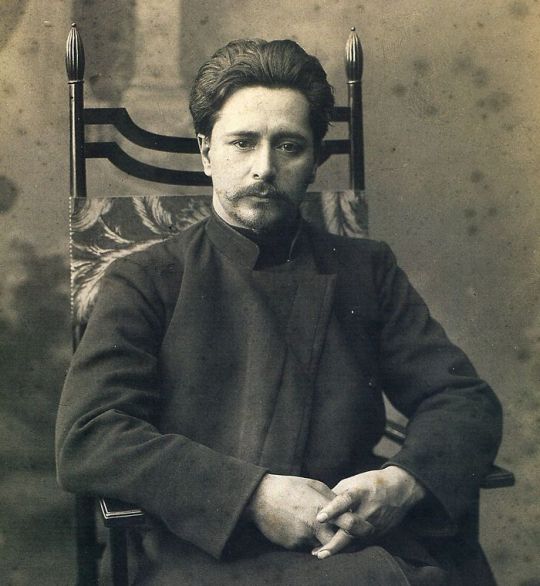
Began her mother, but sobbing, she grew silent
Leonid Andreyev (1871-1919)
Born in 1871 at Orel, Andreyev struggled for many years to earn a livelihood as a lawyer. He began writing in 1900, and was helped and encouraged by Gorky. The note of tragedy and fatalism that characterizes his plays and novels is present also in his numerous short stories, of which Silence is typical.
The present version, translated by John Cournos, was published by Brown Brothers, copyright, 1910. It is reprinted by permission of the present owners, Frank-Maurice, Inc.
Silence
Pane moonlit night in May, while the nightingales sang, Father Ignatius’ wife entered his chamber. Her countenance expressed Itlircring, and the little lamp she held in her hand trembled. Approaching Ixer husband, she touched his shoulder, and managed to say between her sobs:
“Father, let us go to Verochka.”
Without turning his head, Father Ignatius glanced severely at his wife over the rims of his spectacles, and looked long and intently, till (he waved her unoccupied hand and dropped on a low divan.
“That one toward the other be so pitiless!” she pronounced slowly, With emphasis on the final syllables, and her good plump face was distorted with a grimace of pain and exasperation, as if in this manner she winked to express what stern people they were her husband and daughter.
Father Ignatius smiled and arose. Closing his book, he removed his nectacles, placed them in the case and meditated. His long, black beard, in woven with silver threads, lay dignified on his breast, and it slowly heaved at every deep breath.
“Well, let us go!” said he.
Olga Stepanovna quickly arose and entreated in an appealing, timid voice:
“Only don’t revile her, father! You know the sort she is.”
Vera’s chamber was in the attic, and the narrow, wooden stair bent and creaked under the heavy tread of Father Ignatius. Tall and ponderous, he lowered his head to avoid striking the floor of the upper story, and frowned disdainfully when the white jacket of his wife brushed his face. Well he knew that nothing would come of their talk with Vera.
“Why do you come?” asked Vera, raising a bared arm to her eyes. The other arm lay on top of a white summer blanket hardly’distinguish- able from the fabric, so white, translucent and cold was its aspect.
“Verochka!” began her mother, but sobbing, she grew silent.
“Vera!” said her father, making an effort to soften his dry and hard voice. “Vera, tell us, what troubles you?”
Vera was silent.
“Vera, do not, we, your mother and I, deserve your confidence? Do we not love you? And is there someone nearer to you than we? Tell us about your sorrow, and believe me you’ll feel better for it. And we too. Look at your aged mother, how much she suffers!”
“Verochka!”
S: https://travel.doturkey.com/silence-part-1/
0 notes
Photo
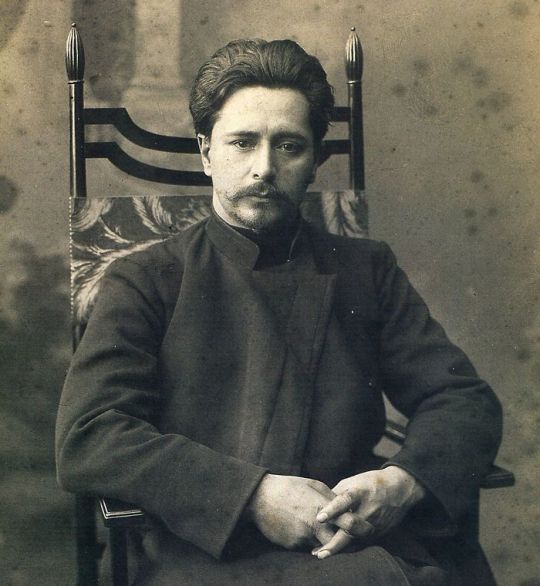
Verochka!
Leonid Andreyev (1871-1919)
Born in 1871 at Orel, Andreyev struggled for many years to earn a livelihood as a lawyer. He began writing in 1900, and was helped and encouraged by Gorky. The note of tragedy and fatalism that characterizes his plays and novels is present also in his numerous short stories, of which Silence is typical.
The present version, translated by John Cournos, was published by Brown Brothers, copyright, 1910. It is reprinted by permission of the present owners, Frank-Maurice, Inc.
Silence
Pane moonlit night in May, while the nightingales sang, Father Ignatius’ wife entered his chamber. Her countenance expressed Itlircring, and the little lamp she held in her hand trembled. Approaching Ixer husband, she touched his shoulder, and managed to say between her sobs:
“Father, let us go to Verochka.”
Without turning his head, Father Ignatius glanced severely at his wife over the rims of his spectacles, and looked long and intently, till (he waved her unoccupied hand and dropped on a low divan.
“That one toward the other be so pitiless!” she pronounced slowly, With emphasis on the final syllables, and her good plump face was distorted with a grimace of pain and exasperation, as if in this manner she winked to express what stern people they were her husband and daughter.
Father Ignatius smiled and arose. Closing his book, he removed his nectacles, placed them in the case and meditated. His long, black beard, in woven with silver threads, lay dignified on his breast, and it slowly heaved at every deep breath.
“Well, let us go!” said he.
Olga Stepanovna quickly arose and entreated in an appealing, timid voice:
“Only don’t revile her, father! You know the sort she is.”
Vera’s chamber was in the attic, and the narrow, wooden stair bent and creaked under the heavy tread of Father Ignatius. Tall and ponderous, he lowered his head to avoid striking the floor of the upper story, and frowned disdainfully when the white jacket of his wife brushed his face. Well he knew that nothing would come of their talk with Vera.
“Why do you come?” asked Vera, raising a bared arm to her eyes. The other arm lay on top of a white summer blanket hardly’distinguish- able from the fabric, so white, translucent and cold was its aspect.
“Verochka!” began her mother, but sobbing, she grew silent.
“Vera!” said her father, making an effort to soften his dry and hard voice. “Vera, tell us, what troubles you?”
Vera was silent.
“Vera, do not, we, your mother and I, deserve your confidence? Do we not love you? And is there someone nearer to you than we? Tell us about your sorrow, and believe me you’ll feel better for it. And we too. Look at your aged mother, how much she suffers!”
Source: https://universal.doholidays.com/silence-part-1/
0 notes
Photo

Verochka!
Leonid Andreyev (1871-1919)
Born in 1871 at Orel, Andreyev struggled for many years to earn a livelihood as a lawyer. He began writing in 1900, and was helped and encouraged by Gorky. The note of tragedy and fatalism that characterizes his plays and novels is present also in his numerous short stories, of which Silence is typical.
The present version, translated by John Cournos, was published by Brown Brothers, copyright, 1910. It is reprinted by permission of the present owners, Frank-Maurice, Inc.
Silence
Pane moonlit night in May, while the nightingales sang, Father Ignatius’ wife entered his chamber. Her countenance expressed Itlircring, and the little lamp she held in her hand trembled. Approaching Ixer husband, she touched his shoulder, and managed to say between her sobs:
“Father, let us go to Verochka.”
Without turning his head, Father Ignatius glanced severely at his wife over the rims of his spectacles, and looked long and intently, till (he waved her unoccupied hand and dropped on a low divan.
“That one toward the other be so pitiless!” she pronounced slowly, With emphasis on the final syllables, and her good plump face was distorted with a grimace of pain and exasperation, as if in this manner she winked to express what stern people they were her husband and daughter.
Father Ignatius smiled and arose. Closing his book, he removed his nectacles, placed them in the case and meditated. His long, black beard, in woven with silver threads, lay dignified on his breast, and it slowly heaved at every deep breath.
“Well, let us go!” said he.
Olga Stepanovna quickly arose and entreated in an appealing, timid voice:
“Only don’t revile her, father! You know the sort she is.”
Vera’s chamber was in the attic, and the narrow, wooden stair bent and creaked under the heavy tread of Father Ignatius. Tall and ponderous, he lowered his head to avoid striking the floor of the upper story, and frowned disdainfully when the white jacket of his wife brushed his face. Well he knew that nothing would come of their talk with Vera.
“Why do you come?” asked Vera, raising a bared arm to her eyes. The other arm lay on top of a white summer blanket hardly’distinguish- able from the fabric, so white, translucent and cold was its aspect.
“Verochka!” began her mother, but sobbing, she grew silent.
“Vera!” said her father, making an effort to soften his dry and hard voice. “Vera, tell us, what troubles you?”
Vera was silent.
“Vera, do not, we, your mother and I, deserve your confidence? Do we not love you? And is there someone nearer to you than we? Tell us about your sorrow, and believe me you’ll feel better for it. And we too. Look at your aged mother, how much she suffers!”
Source: https://universal.doholidays.com/silence-part-1/
0 notes
Photo
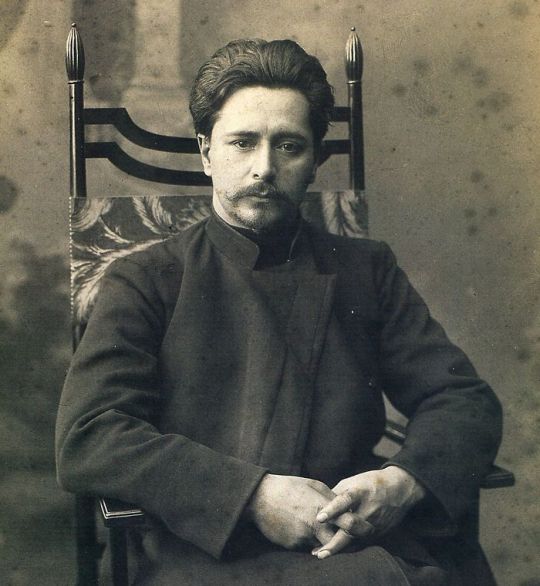
Verochka!
Leonid Andreyev (1871-1919)
Born in 1871 at Orel, Andreyev struggled for many years to earn a livelihood as a lawyer. He began writing in 1900, and was helped and encouraged by Gorky. The note of tragedy and fatalism that characterizes his plays and novels is present also in his numerous short stories, of which Silence is typical.
The present version, translated by John Cournos, was published by Brown Brothers, copyright, 1910. It is reprinted by permission of the present owners, Frank-Maurice, Inc.
Silence
Pane moonlit night in May, while the nightingales sang, Father Ignatius’ wife entered his chamber. Her countenance expressed Itlircring, and the little lamp she held in her hand trembled. Approaching Ixer husband, she touched his shoulder, and managed to say between her sobs:
“Father, let us go to Verochka.”
Without turning his head, Father Ignatius glanced severely at his wife over the rims of his spectacles, and looked long and intently, till (he waved her unoccupied hand and dropped on a low divan.
“That one toward the other be so pitiless!” she pronounced slowly, With emphasis on the final syllables, and her good plump face was distorted with a grimace of pain and exasperation, as if in this manner she winked to express what stern people they were her husband and daughter.
Father Ignatius smiled and arose. Closing his book, he removed his nectacles, placed them in the case and meditated. His long, black beard, in woven with silver threads, lay dignified on his breast, and it slowly heaved at every deep breath.
“Well, let us go!” said he.
Olga Stepanovna quickly arose and entreated in an appealing, timid voice:
“Only don’t revile her, father! You know the sort she is.”
Vera’s chamber was in the attic, and the narrow, wooden stair bent and creaked under the heavy tread of Father Ignatius. Tall and ponderous, he lowered his head to avoid striking the floor of the upper story, and frowned disdainfully when the white jacket of his wife brushed his face. Well he knew that nothing would come of their talk with Vera.
“Why do you come?” asked Vera, raising a bared arm to her eyes. The other arm lay on top of a white summer blanket hardly’distinguish- able from the fabric, so white, translucent and cold was its aspect.
“Verochka!” began her mother, but sobbing, she grew silent.
“Vera!” said her father, making an effort to soften his dry and hard voice. “Vera, tell us, what troubles you?”
Vera was silent.
“Vera, do not, we, your mother and I, deserve your confidence? Do we not love you? And is there someone nearer to you than we? Tell us about your sorrow, and believe me you’ll feel better for it. And we too. Look at your aged mother, how much she suffers!”
Source: https://universal.doholidays.com/silence-part-1/
0 notes
Photo

Verochka!
Leonid Andreyev (1871-1919)
Born in 1871 at Orel, Andreyev struggled for many years to earn a livelihood as a lawyer. He began writing in 1900, and was helped and encouraged by Gorky. The note of tragedy and fatalism that characterizes his plays and novels is present also in his numerous short stories, of which Silence is typical.
The present version, translated by John Cournos, was published by Brown Brothers, copyright, 1910. It is reprinted by permission of the present owners, Frank-Maurice, Inc.
Silence
Pane moonlit night in May, while the nightingales sang, Father Ignatius’ wife entered his chamber. Her countenance expressed Itlircring, and the little lamp she held in her hand trembled. Approaching Ixer husband, she touched his shoulder, and managed to say between her sobs:
“Father, let us go to Verochka.”
Without turning his head, Father Ignatius glanced severely at his wife over the rims of his spectacles, and looked long and intently, till (he waved her unoccupied hand and dropped on a low divan.
“That one toward the other be so pitiless!” she pronounced slowly, With emphasis on the final syllables, and her good plump face was distorted with a grimace of pain and exasperation, as if in this manner she winked to express what stern people they were her husband and daughter.
Father Ignatius smiled and arose. Closing his book, he removed his nectacles, placed them in the case and meditated. His long, black beard, in woven with silver threads, lay dignified on his breast, and it slowly heaved at every deep breath.
“Well, let us go!” said he.
Olga Stepanovna quickly arose and entreated in an appealing, timid voice:
“Only don’t revile her, father! You know the sort she is.”
Vera’s chamber was in the attic, and the narrow, wooden stair bent and creaked under the heavy tread of Father Ignatius. Tall and ponderous, he lowered his head to avoid striking the floor of the upper story, and frowned disdainfully when the white jacket of his wife brushed his face. Well he knew that nothing would come of their talk with Vera.
“Why do you come?” asked Vera, raising a bared arm to her eyes. The other arm lay on top of a white summer blanket hardly’distinguish- able from the fabric, so white, translucent and cold was its aspect.
“Verochka!” began her mother, but sobbing, she grew silent.
“Vera!” said her father, making an effort to soften his dry and hard voice. “Vera, tell us, what troubles you?”
Vera was silent.
“Vera, do not, we, your mother and I, deserve your confidence? Do we not love you? And is there someone nearer to you than we? Tell us about your sorrow, and believe me you’ll feel better for it. And we too. Look at your aged mother, how much she suffers!”
Source: https://universal.doholidays.com/silence-part-1/
0 notes
Photo
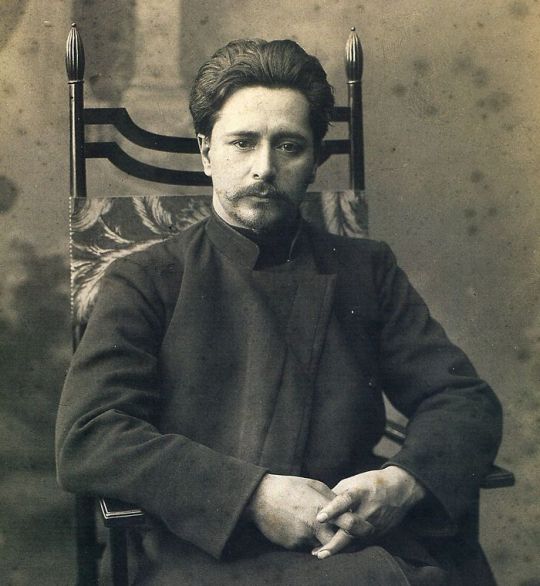
Began her mother, but sobbing, she grew silent
Leonid Andreyev (1871-1919)
Born in 1871 at Orel, Andreyev struggled for many years to earn a livelihood as a lawyer. He began writing in 1900, and was helped and encouraged by Gorky. The note of tragedy and fatalism that characterizes his plays and novels is present also in his numerous short stories, of which Silence is typical.
The present version, translated by John Cournos, was published by Brown Brothers, copyright, 1910. It is reprinted by permission of the present owners, Frank-Maurice, Inc.
Silence
Pane moonlit night in May, while the nightingales sang, Father Ignatius’ wife entered his chamber. Her countenance expressed Itlircring, and the little lamp she held in her hand trembled. Approaching Ixer husband, she touched his shoulder, and managed to say between her sobs:
“Father, let us go to Verochka.”
Without turning his head, Father Ignatius glanced severely at his wife over the rims of his spectacles, and looked long and intently, till (he waved her unoccupied hand and dropped on a low divan.
“That one toward the other be so pitiless!” she pronounced slowly, With emphasis on the final syllables, and her good plump face was distorted with a grimace of pain and exasperation, as if in this manner she winked to express what stern people they were her husband and daughter.
Father Ignatius smiled and arose. Closing his book, he removed his nectacles, placed them in the case and meditated. His long, black beard, in woven with silver threads, lay dignified on his breast, and it slowly heaved at every deep breath.
“Well, let us go!” said he.
Olga Stepanovna quickly arose and entreated in an appealing, timid voice:
“Only don’t revile her, father! You know the sort she is.”
Vera’s chamber was in the attic, and the narrow, wooden stair bent and creaked under the heavy tread of Father Ignatius. Tall and ponderous, he lowered his head to avoid striking the floor of the upper story, and frowned disdainfully when the white jacket of his wife brushed his face. Well he knew that nothing would come of their talk with Vera.
“Why do you come?” asked Vera, raising a bared arm to her eyes. The other arm lay on top of a white summer blanket hardly’distinguish- able from the fabric, so white, translucent and cold was its aspect.
“Verochka!” began her mother, but sobbing, she grew silent.
“Vera!” said her father, making an effort to soften his dry and hard voice. “Vera, tell us, what troubles you?”
Vera was silent.
“Vera, do not, we, your mother and I, deserve your confidence? Do we not love you? And is there someone nearer to you than we? Tell us about your sorrow, and believe me you’ll feel better for it. And we too. Look at your aged mother, how much she suffers!”
“Verochka!”
S: https://travel.doturkey.com/silence-part-1/
0 notes
Photo
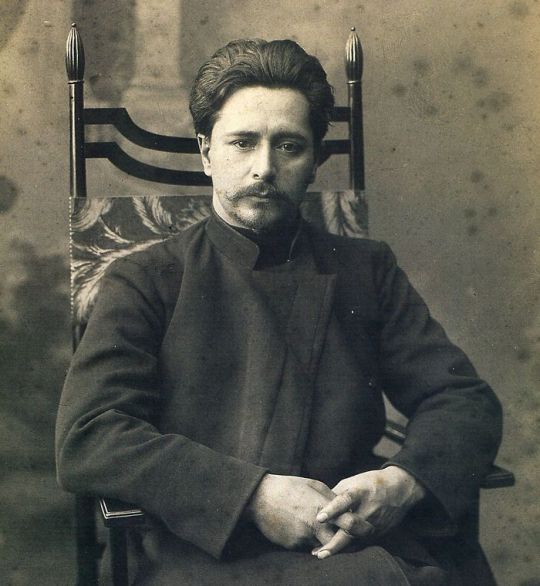
Began her mother, but sobbing, she grew silent
Leonid Andreyev (1871-1919)
Born in 1871 at Orel, Andreyev struggled for many years to earn a livelihood as a lawyer. He began writing in 1900, and was helped and encouraged by Gorky. The note of tragedy and fatalism that characterizes his plays and novels is present also in his numerous short stories, of which Silence is typical.
The present version, translated by John Cournos, was published by Brown Brothers, copyright, 1910. It is reprinted by permission of the present owners, Frank-Maurice, Inc.
Silence
Pane moonlit night in May, while the nightingales sang, Father Ignatius’ wife entered his chamber. Her countenance expressed Itlircring, and the little lamp she held in her hand trembled. Approaching Ixer husband, she touched his shoulder, and managed to say between her sobs:
“Father, let us go to Verochka.”
Without turning his head, Father Ignatius glanced severely at his wife over the rims of his spectacles, and looked long and intently, till (he waved her unoccupied hand and dropped on a low divan.
“That one toward the other be so pitiless!” she pronounced slowly, With emphasis on the final syllables, and her good plump face was distorted with a grimace of pain and exasperation, as if in this manner she winked to express what stern people they were her husband and daughter.
Father Ignatius smiled and arose. Closing his book, he removed his nectacles, placed them in the case and meditated. His long, black beard, in woven with silver threads, lay dignified on his breast, and it slowly heaved at every deep breath.
“Well, let us go!” said he.
Olga Stepanovna quickly arose and entreated in an appealing, timid voice:
“Only don’t revile her, father! You know the sort she is.”
Vera’s chamber was in the attic, and the narrow, wooden stair bent and creaked under the heavy tread of Father Ignatius. Tall and ponderous, he lowered his head to avoid striking the floor of the upper story, and frowned disdainfully when the white jacket of his wife brushed his face. Well he knew that nothing would come of their talk with Vera.
“Why do you come?” asked Vera, raising a bared arm to her eyes. The other arm lay on top of a white summer blanket hardly’distinguish- able from the fabric, so white, translucent and cold was its aspect.
“Verochka!” began her mother, but sobbing, she grew silent.
“Vera!” said her father, making an effort to soften his dry and hard voice. “Vera, tell us, what troubles you?”
Vera was silent.
“Vera, do not, we, your mother and I, deserve your confidence? Do we not love you? And is there someone nearer to you than we? Tell us about your sorrow, and believe me you’ll feel better for it. And we too. Look at your aged mother, how much she suffers!”
“Verochka!”
S: https://travel.doturkey.com/silence-part-1/
0 notes
Photo
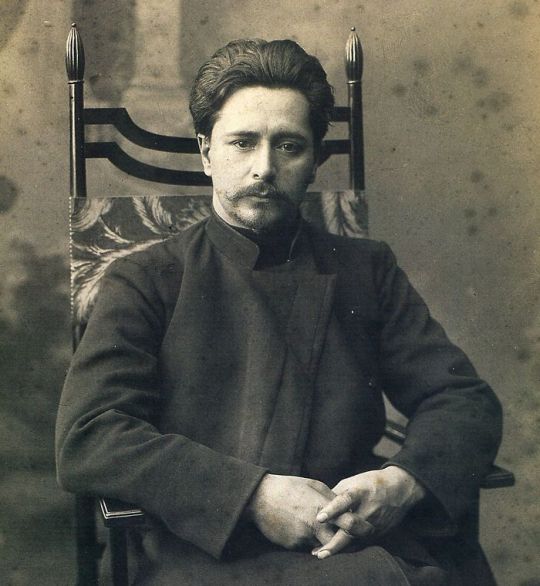
Began her mother, but sobbing, she grew silent
Leonid Andreyev (1871-1919)
Born in 1871 at Orel, Andreyev struggled for many years to earn a livelihood as a lawyer. He began writing in 1900, and was helped and encouraged by Gorky. The note of tragedy and fatalism that characterizes his plays and novels is present also in his numerous short stories, of which Silence is typical.
The present version, translated by John Cournos, was published by Brown Brothers, copyright, 1910. It is reprinted by permission of the present owners, Frank-Maurice, Inc.
Silence
Pane moonlit night in May, while the nightingales sang, Father Ignatius’ wife entered his chamber. Her countenance expressed Itlircring, and the little lamp she held in her hand trembled. Approaching Ixer husband, she touched his shoulder, and managed to say between her sobs:
“Father, let us go to Verochka.”
Without turning his head, Father Ignatius glanced severely at his wife over the rims of his spectacles, and looked long and intently, till (he waved her unoccupied hand and dropped on a low divan.
“That one toward the other be so pitiless!” she pronounced slowly, With emphasis on the final syllables, and her good plump face was distorted with a grimace of pain and exasperation, as if in this manner she winked to express what stern people they were her husband and daughter.
Father Ignatius smiled and arose. Closing his book, he removed his nectacles, placed them in the case and meditated. His long, black beard, in woven with silver threads, lay dignified on his breast, and it slowly heaved at every deep breath.
“Well, let us go!” said he.
Olga Stepanovna quickly arose and entreated in an appealing, timid voice:
“Only don’t revile her, father! You know the sort she is.”
Vera’s chamber was in the attic, and the narrow, wooden stair bent and creaked under the heavy tread of Father Ignatius. Tall and ponderous, he lowered his head to avoid striking the floor of the upper story, and frowned disdainfully when the white jacket of his wife brushed his face. Well he knew that nothing would come of their talk with Vera.
“Why do you come?” asked Vera, raising a bared arm to her eyes. The other arm lay on top of a white summer blanket hardly’distinguish- able from the fabric, so white, translucent and cold was its aspect.
“Verochka!” began her mother, but sobbing, she grew silent.
“Vera!” said her father, making an effort to soften his dry and hard voice. “Vera, tell us, what troubles you?”
Vera was silent.
“Vera, do not, we, your mother and I, deserve your confidence? Do we not love you? And is there someone nearer to you than we? Tell us about your sorrow, and believe me you’ll feel better for it. And we too. Look at your aged mother, how much she suffers!”
“Verochka!”
S: https://travel.doturkey.com/silence-part-1/
0 notes
Photo

Began her mother, but sobbing, she grew silent
Leonid Andreyev (1871-1919)
Born in 1871 at Orel, Andreyev struggled for many years to earn a livelihood as a lawyer. He began writing in 1900, and was helped and encouraged by Gorky. The note of tragedy and fatalism that characterizes his plays and novels is present also in his numerous short stories, of which Silence is typical.
The present version, translated by John Cournos, was published by Brown Brothers, copyright, 1910. It is reprinted by permission of the present owners, Frank-Maurice, Inc.
Silence
Pane moonlit night in May, while the nightingales sang, Father Ignatius’ wife entered his chamber. Her countenance expressed Itlircring, and the little lamp she held in her hand trembled. Approaching Ixer husband, she touched his shoulder, and managed to say between her sobs:
“Father, let us go to Verochka.”
Without turning his head, Father Ignatius glanced severely at his wife over the rims of his spectacles, and looked long and intently, till (he waved her unoccupied hand and dropped on a low divan.
“That one toward the other be so pitiless!” she pronounced slowly, With emphasis on the final syllables, and her good plump face was distorted with a grimace of pain and exasperation, as if in this manner she winked to express what stern people they were her husband and daughter.
Father Ignatius smiled and arose. Closing his book, he removed his nectacles, placed them in the case and meditated. His long, black beard, in woven with silver threads, lay dignified on his breast, and it slowly heaved at every deep breath.
“Well, let us go!” said he.
Olga Stepanovna quickly arose and entreated in an appealing, timid voice:
“Only don’t revile her, father! You know the sort she is.”
Vera’s chamber was in the attic, and the narrow, wooden stair bent and creaked under the heavy tread of Father Ignatius. Tall and ponderous, he lowered his head to avoid striking the floor of the upper story, and frowned disdainfully when the white jacket of his wife brushed his face. Well he knew that nothing would come of their talk with Vera.
“Why do you come?” asked Vera, raising a bared arm to her eyes. The other arm lay on top of a white summer blanket hardly’distinguish- able from the fabric, so white, translucent and cold was its aspect.
“Verochka!” began her mother, but sobbing, she grew silent.
“Vera!” said her father, making an effort to soften his dry and hard voice. “Vera, tell us, what troubles you?”
Vera was silent.
“Vera, do not, we, your mother and I, deserve your confidence? Do we not love you? And is there someone nearer to you than we? Tell us about your sorrow, and believe me you’ll feel better for it. And we too. Look at your aged mother, how much she suffers!”
“Verochka!”
S: https://travel.doturkey.com/silence-part-1/
0 notes
Photo
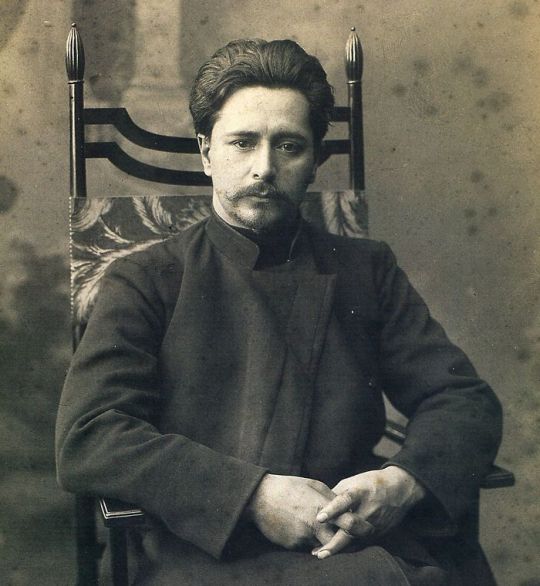
Began her mother, but sobbing, she grew silent
Leonid Andreyev (1871-1919)
Born in 1871 at Orel, Andreyev struggled for many years to earn a livelihood as a lawyer. He began writing in 1900, and was helped and encouraged by Gorky. The note of tragedy and fatalism that characterizes his plays and novels is present also in his numerous short stories, of which Silence is typical.
The present version, translated by John Cournos, was published by Brown Brothers, copyright, 1910. It is reprinted by permission of the present owners, Frank-Maurice, Inc.
Silence
Pane moonlit night in May, while the nightingales sang, Father Ignatius’ wife entered his chamber. Her countenance expressed Itlircring, and the little lamp she held in her hand trembled. Approaching Ixer husband, she touched his shoulder, and managed to say between her sobs:
“Father, let us go to Verochka.”
Without turning his head, Father Ignatius glanced severely at his wife over the rims of his spectacles, and looked long and intently, till (he waved her unoccupied hand and dropped on a low divan.
“That one toward the other be so pitiless!” she pronounced slowly, With emphasis on the final syllables, and her good plump face was distorted with a grimace of pain and exasperation, as if in this manner she winked to express what stern people they were her husband and daughter.
Father Ignatius smiled and arose. Closing his book, he removed his nectacles, placed them in the case and meditated. His long, black beard, in woven with silver threads, lay dignified on his breast, and it slowly heaved at every deep breath.
“Well, let us go!” said he.
Olga Stepanovna quickly arose and entreated in an appealing, timid voice:
“Only don’t revile her, father! You know the sort she is.”
Vera’s chamber was in the attic, and the narrow, wooden stair bent and creaked under the heavy tread of Father Ignatius. Tall and ponderous, he lowered his head to avoid striking the floor of the upper story, and frowned disdainfully when the white jacket of his wife brushed his face. Well he knew that nothing would come of their talk with Vera.
“Why do you come?” asked Vera, raising a bared arm to her eyes. The other arm lay on top of a white summer blanket hardly’distinguish- able from the fabric, so white, translucent and cold was its aspect.
“Verochka!” began her mother, but sobbing, she grew silent.
“Vera!” said her father, making an effort to soften his dry and hard voice. “Vera, tell us, what troubles you?”
Vera was silent.
“Vera, do not, we, your mother and I, deserve your confidence? Do we not love you? And is there someone nearer to you than we? Tell us about your sorrow, and believe me you’ll feel better for it. And we too. Look at your aged mother, how much she suffers!”
“Verochka!”
S: https://travel.doturkey.com/silence-part-1/
0 notes
Photo
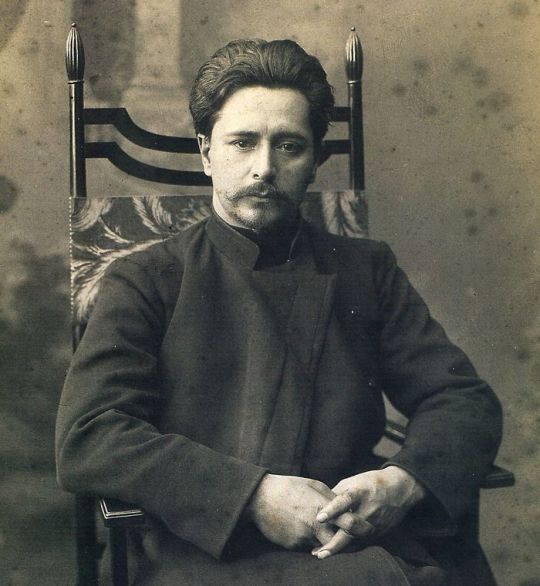
Began her mother, but sobbing, she grew silent
Leonid Andreyev (1871-1919)
Born in 1871 at Orel, Andreyev struggled for many years to earn a livelihood as a lawyer. He began writing in 1900, and was helped and encouraged by Gorky. The note of tragedy and fatalism that characterizes his plays and novels is present also in his numerous short stories, of which Silence is typical.
The present version, translated by John Cournos, was published by Brown Brothers, copyright, 1910. It is reprinted by permission of the present owners, Frank-Maurice, Inc.
Silence
Pane moonlit night in May, while the nightingales sang, Father Ignatius’ wife entered his chamber. Her countenance expressed Itlircring, and the little lamp she held in her hand trembled. Approaching Ixer husband, she touched his shoulder, and managed to say between her sobs:
“Father, let us go to Verochka.”
Without turning his head, Father Ignatius glanced severely at his wife over the rims of his spectacles, and looked long and intently, till (he waved her unoccupied hand and dropped on a low divan.
“That one toward the other be so pitiless!” she pronounced slowly, With emphasis on the final syllables, and her good plump face was distorted with a grimace of pain and exasperation, as if in this manner she winked to express what stern people they were her husband and daughter.
Father Ignatius smiled and arose. Closing his book, he removed his nectacles, placed them in the case and meditated. His long, black beard, in woven with silver threads, lay dignified on his breast, and it slowly heaved at every deep breath.
“Well, let us go!” said he.
Olga Stepanovna quickly arose and entreated in an appealing, timid voice:
“Only don’t revile her, father! You know the sort she is.”
Vera’s chamber was in the attic, and the narrow, wooden stair bent and creaked under the heavy tread of Father Ignatius. Tall and ponderous, he lowered his head to avoid striking the floor of the upper story, and frowned disdainfully when the white jacket of his wife brushed his face. Well he knew that nothing would come of their talk with Vera.
“Why do you come?” asked Vera, raising a bared arm to her eyes. The other arm lay on top of a white summer blanket hardly’distinguish- able from the fabric, so white, translucent and cold was its aspect.
“Verochka!” began her mother, but sobbing, she grew silent.
“Vera!” said her father, making an effort to soften his dry and hard voice. “Vera, tell us, what troubles you?”
Vera was silent.
“Vera, do not, we, your mother and I, deserve your confidence? Do we not love you? And is there someone nearer to you than we? Tell us about your sorrow, and believe me you’ll feel better for it. And we too. Look at your aged mother, how much she suffers!”
“Verochka!”
S: https://travel.doturkey.com/silence-part-1/
0 notes
Photo

Began her mother, but sobbing, she grew silent
Leonid Andreyev (1871-1919)
Born in 1871 at Orel, Andreyev struggled for many years to earn a livelihood as a lawyer. He began writing in 1900, and was helped and encouraged by Gorky. The note of tragedy and fatalism that characterizes his plays and novels is present also in his numerous short stories, of which Silence is typical.
The present version, translated by John Cournos, was published by Brown Brothers, copyright, 1910. It is reprinted by permission of the present owners, Frank-Maurice, Inc.
Silence
Pane moonlit night in May, while the nightingales sang, Father Ignatius’ wife entered his chamber. Her countenance expressed Itlircring, and the little lamp she held in her hand trembled. Approaching Ixer husband, she touched his shoulder, and managed to say between her sobs:
“Father, let us go to Verochka.”
Without turning his head, Father Ignatius glanced severely at his wife over the rims of his spectacles, and looked long and intently, till (he waved her unoccupied hand and dropped on a low divan.
“That one toward the other be so pitiless!” she pronounced slowly, With emphasis on the final syllables, and her good plump face was distorted with a grimace of pain and exasperation, as if in this manner she winked to express what stern people they were her husband and daughter.
Father Ignatius smiled and arose. Closing his book, he removed his nectacles, placed them in the case and meditated. His long, black beard, in woven with silver threads, lay dignified on his breast, and it slowly heaved at every deep breath.
“Well, let us go!” said he.
Olga Stepanovna quickly arose and entreated in an appealing, timid voice:
“Only don’t revile her, father! You know the sort she is.”
Vera’s chamber was in the attic, and the narrow, wooden stair bent and creaked under the heavy tread of Father Ignatius. Tall and ponderous, he lowered his head to avoid striking the floor of the upper story, and frowned disdainfully when the white jacket of his wife brushed his face. Well he knew that nothing would come of their talk with Vera.
“Why do you come?” asked Vera, raising a bared arm to her eyes. The other arm lay on top of a white summer blanket hardly’distinguish- able from the fabric, so white, translucent and cold was its aspect.
“Verochka!” began her mother, but sobbing, she grew silent.
“Vera!” said her father, making an effort to soften his dry and hard voice. “Vera, tell us, what troubles you?”
Vera was silent.
“Vera, do not, we, your mother and I, deserve your confidence? Do we not love you? And is there someone nearer to you than we? Tell us about your sorrow, and believe me you’ll feel better for it. And we too. Look at your aged mother, how much she suffers!”
“Verochka!”
S: https://travel.doturkey.com/silence-part-1/
0 notes